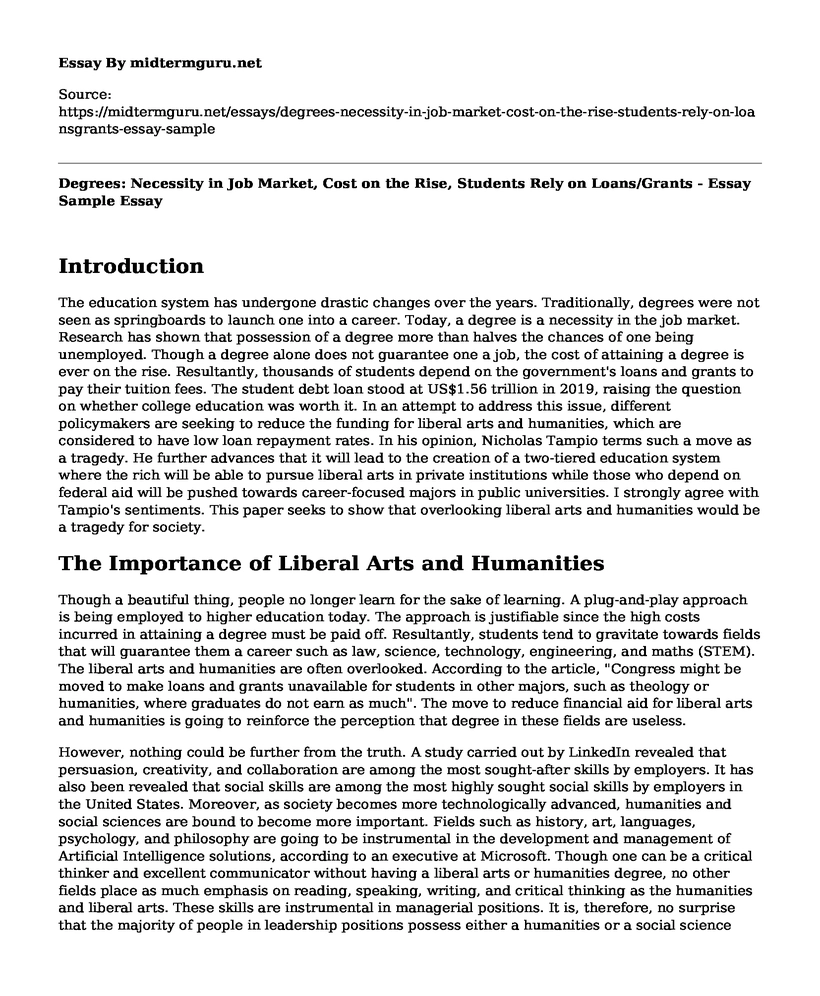Introduction
The education system has undergone drastic changes over the years. Traditionally, degrees were not seen as springboards to launch one into a career. Today, a degree is a necessity in the job market. Research has shown that possession of a degree more than halves the chances of one being unemployed. Though a degree alone does not guarantee one a job, the cost of attaining a degree is ever on the rise. Resultantly, thousands of students depend on the government's loans and grants to pay their tuition fees. The student debt loan stood at US$1.56 trillion in 2019, raising the question on whether college education was worth it. In an attempt to address this issue, different policymakers are seeking to reduce the funding for liberal arts and humanities, which are considered to have low loan repayment rates. In his opinion, Nicholas Tampio terms such a move as a tragedy. He further advances that it will lead to the creation of a two-tiered education system where the rich will be able to pursue liberal arts in private institutions while those who depend on federal aid will be pushed towards career-focused majors in public universities. I strongly agree with Tampio's sentiments. This paper seeks to show that overlooking liberal arts and humanities would be a tragedy for society.
The Importance of Liberal Arts and Humanities
Though a beautiful thing, people no longer learn for the sake of learning. A plug-and-play approach is being employed to higher education today. The approach is justifiable since the high costs incurred in attaining a degree must be paid off. Resultantly, students tend to gravitate towards fields that will guarantee them a career such as law, science, technology, engineering, and maths (STEM). The liberal arts and humanities are often overlooked. According to the article, "Congress might be moved to make loans and grants unavailable for students in other majors, such as theology or humanities, where graduates do not earn as much". The move to reduce financial aid for liberal arts and humanities is going to reinforce the perception that degree in these fields are useless.
However, nothing could be further from the truth. A study carried out by LinkedIn revealed that persuasion, creativity, and collaboration are among the most sought-after skills by employers. It has also been revealed that social skills are among the most highly sought social skills by employers in the United States. Moreover, as society becomes more technologically advanced, humanities and social sciences are bound to become more important. Fields such as history, art, languages, psychology, and philosophy are going to be instrumental in the development and management of Artificial Intelligence solutions, according to an executive at Microsoft. Though one can be a critical thinker and excellent communicator without having a liberal arts or humanities degree, no other fields place as much emphasis on reading, speaking, writing, and critical thinking as the humanities and liberal arts. These skills are instrumental in managerial positions. It is, therefore, no surprise that the majority of people in leadership positions possess either a humanities or a social science degree. Studies have also shown that 3 of the ten fastest-growing occupations require a liberal arts or humanities degree. Therefore, cutting financial aid for students seeking to pursue liberal arts or humanities would not only go against the very purpose of education but would also be overlooking the demands of the market.
Conclusion
The move by the government as well as other players to focus more on the economic returns of higher education may overshadow the other reasons why students join colleges such as reading the greatest books in human history and asking big questions regarding justice and the world at large. Moreover, the move would amplify the inequality between the poor and the rich since some students will be unable to pursue their preferred majors without federal aid.
Bibliography
Ruggeri, Amanda. 2019. "Why 'worthless' humanities degrees may set you up for life." BBC. April 2. Accessed June 11, 2019. http://www.bbc.com/capital/story/20190401-why-worthless-humanities-degrees-may-set-you-up-for-life.
Tampio, Nicholas. 2019. "New Gates-funded commission aims to put a value on a college education." The Conversation. May 16. Accessed June 11, 2019. https://theconversation.com/new-gates-funded-commission-aims-to-put-a-value-on-a-college-education-116930.
Cite this page
Degrees: Necessity in Job Market, Cost on the Rise, Students Rely on Loans/Grants - Essay Sample. (2023, Jan 20). Retrieved from https://midtermguru.com/essays/degrees-necessity-in-job-market-cost-on-the-rise-students-rely-on-loansgrants-essay-sample
If you are the original author of this essay and no longer wish to have it published on the midtermguru.com website, please click below to request its removal:
- Teaching for Intelligence - Essay Sample
- Reflection on a Personal or Professional Situation - Paper Example
- Admission Essay: Finance and Investment
- Article Analysis Essay on 'As normal as possible'
- Questions and Answers Essay on Raising Taxes in California
- Employee Satisfaction: Essential for Performance & Quality - Essay Sample
- Why Parents Are Sometimes Strict? - Essay Sample







